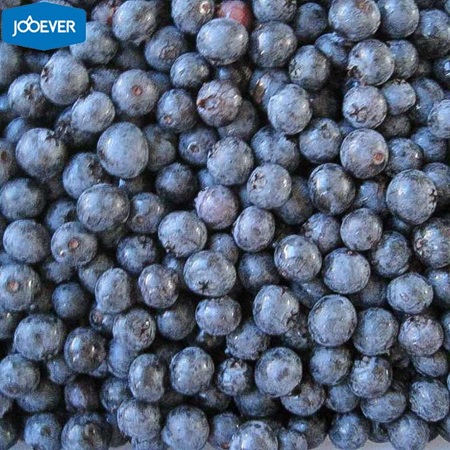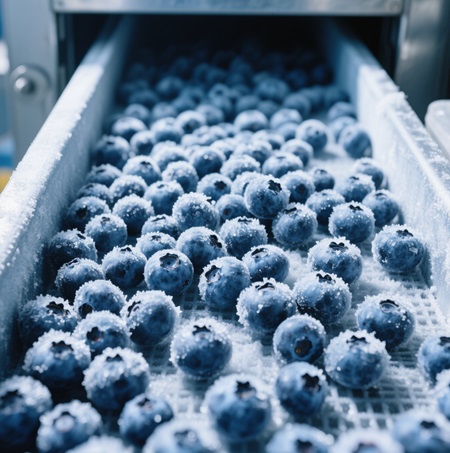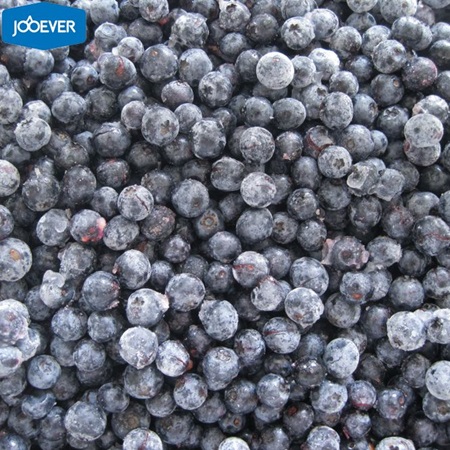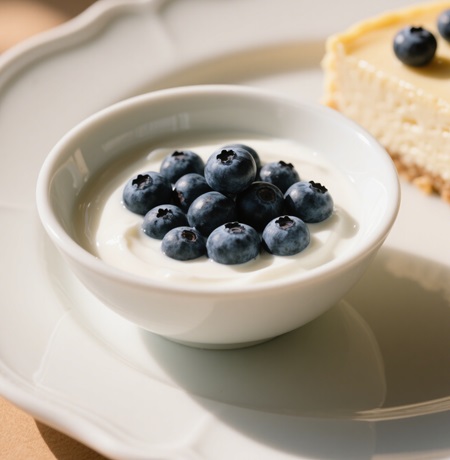Your reliable partner for frozen foods
Frozen blueberries are a pantry essential for health-conscious consumers, bakers, and smoothie lovers alike. Their vibrant color, antioxidant content, and year-round availability make them a staple in many homes and commercial kitchens. But no matter how often you use them, one common question always pops up—how long do frozen blueberries last? In this guide, we'll explore everything you need to know about their shelf life, proper storage methods, signs of spoilage, and why the freezing method matters more than you might think.
When stored correctly at 0°F (-18°C) or lower, frozen blueberries typically maintain peak quality for 8 to 12 months. After that, they may still be safe to eat, but you'll likely notice a decline in flavor, texture, and color. The antioxidants and nutrients, while relatively stable, may also degrade slightly over time.
However, this timeline can vary based on how the blueberries were frozen. IQF (Individually Quick Frozen) blueberries, for example, are rapidly frozen at very low temperatures, locking in freshness at the cellular level. This process allows them to last up to 18–24 months in optimal conditions—significantly longer than conventionally frozen or home-frozen berries.
For households that stock up occasionally, this means fewer worries about waste. For commercial buyers, it translates into better planning, fewer quality issues, and extended product usability.

The way blueberries are frozen plays a crucial role in how long they stay good. There are three main freezing methods: home freezing, block freezing, and IQF (Individually Quick Frozen).
Home freezing typically involves spreading fresh blueberries on a tray and freezing them slowly in a regular freezer. While this method is accessible, it tends to form larger ice crystals that rupture berry cells, making them mushy when thawed. Shelf life is also shorter—usually around 3–6 months before quality noticeably drops.
Block freezing is often used for mass production where blueberries are frozen in large clusters. It may save time and cost but results in clumping and uneven texture. Once you thaw a block, it's difficult to refreeze, leading to faster spoilage.
IQF freezing, on the other hand, uses high-speed freezing tunnels to lock in each berry's texture, color, and nutrients. Each blueberry is frozen separately within minutes of harvest. This not only prevents clumping and ice burn but also gives you the flexibility to use only what you need without affecting the rest. The result: a longer shelf life, better taste, and less waste—both at home and in industrial settings.

Frozen doesn't mean forever. While freezing greatly slows spoilage, blueberries can still go bad, especially if stored improperly. Knowing the signs can help prevent unpleasant surprises in your recipes.
Watch out for:
Freezer burn: Excessive frost or a whitish coating means moisture has evaporated from the berries, leaving them dry and bland.
Discoloration: If the berries turn grayish or dull, their quality has likely declined.
Off smell: A sour, fermented, or "off" odor is a sign of spoilage.
Clumping: If blueberries are stuck together in large blocks, they may have thawed and refrozen—reducing their quality and safety.

IQF blueberries offer better visibility here. Because they're frozen individually, it's easier to inspect each berry and avoid using low-quality ones. You can use what you need and leave the rest untouched, preserving freshness longer.
Storing frozen blueberries correctly can make a big difference in how long they last—and how good they taste when you use them. Here are some proven tips:
Keep them sealed: Use airtight bags or containers to avoid air exposure, which leads to freezer burn.
Label them: Always mark the packaging with the freezing date so you can track freshness.
Avoid frequent opening: Each time you open the freezer door, temperature fluctuations can harm berry quality.
Don't overpack your freezer: Cold air circulation is essential to consistent freezing.
Don't refreeze thawed berries: Each thaw-refreeze cycle damages texture and shortens shelf life.
IQF frozen blueberries are particularly easy to manage because they stay loose in the bag. You can pour out a handful for a smoothie or baking recipe without disturbing the rest. This portion-control advantage helps you extend the product's life while minimizing waste.
Technically, frozen blueberries don't “expire” the way fresh fruit does. Instead, they come with a “best by” or “use by” date indicating when their flavor, texture, and nutritional value are at their peak.
Still, even under ideal conditions, time eventually takes its toll. Ice crystals may form, flavors can fade, and the berries might become softer over time. This doesn't necessarily make them unsafe, but it does affect their culinary quality.
Commercially packed IQF blueberries often include detailed traceability, harvest dates, and batch codes, which can be crucial for businesses and quality-conscious consumers. If you're purchasing in bulk, choose suppliers that offer transparent labeling and reliable shelf-life guarantees.

Thawing frozen blueberries the right way helps preserve their texture, taste, and nutritional value. Done incorrectly, and you risk ending up with soggy, broken berries that leak juice and lose their appeal—especially when using them in fresh dishes.
Transfer the desired portion of frozen blueberries into a covered container or bowl and leave them in the refrigerator for 6 to 8 hours or overnight. This method thaws the berries gradually, minimizing juice loss and helping them maintain their original shape and firmness. It's ideal when blueberries will be used in yogurt, fruit salads, oatmeal, or eaten directly.
If you need your blueberries sooner, lay them out in a single layer on a paper towel or plate and let them sit at room temperature for 30 to 60 minutes. While this method is faster, it can soften the berries more and cause them to weep juice. It works well when berries are destined for sauces, compotes, or blended drinks.
For the fastest thaw, place the frozen blueberries in a microwave-safe bowl and use the “defrost” setting or low heat in 15–20 second intervals. Stir between each cycle to distribute heat evenly. This method is not suitable for fresh presentation but is perfectly fine for baking, jams, or smoothies where texture isn't a concern.
Once blueberries have been thawed, they should not be frozen again. Refreezing promotes water loss, texture breakdown, and even microbial risk. Always thaw only what you need, and refrigerate leftovers for no more than 48 hours.
Blueberries are well known for their high antioxidant levels, particularly anthocyanins, which give them their deep blue color. The good news? Freezing preserves most of these nutrients surprisingly well.
Studies show that frozen blueberries retain over 90% of their original antioxidant content even after several months. Vitamins like Vitamin C may drop slightly over time, but the change is minimal if berries are kept properly frozen.
IQF freezing especially excels here. Because berries are frozen rapidly right after harvest, nutrient degradation is significantly reduced compared to slow or delayed freezing processes. That makes IQF berries a smart nutritional choice—not just a convenient one.
For restaurants, beverage manufacturers, and bakeries, shelf life isn't just a question of convenience—it's a cost and quality control issue. Spoiled or compromised ingredients lead to customer complaints, financial losses, and supply chain headaches.
This is where IQF blueberries deliver a clear advantage. The longer shelf life, better portion control, and consistent quality make them ideal for:
Smoothie production
Yogurt and dessert topping
Bakery fillings and muffins
Ready-to-eat meal kits
Suppliers like Jooever Foods ensure product consistency, cold chain integrity, and packaging that meets foodservice standards. Bulk buyers benefit from lower waste and predictable cost per serving—something traditional frozen fruit can't always offer.

Yes, frozen blueberries can be eaten straight from the freezer. They're often added directly to smoothies, yogurt, and cereals for a refreshing bite.
It's not recommended. Refreezing leads to moisture loss, cell damage, and flavor degradation. Only thaw what you plan to use.
Absolutely. In many cases, they retain more nutrients than “fresh” berries that have spent days in transport. IQF berries are frozen quickly after harvest, preserving more vitamins and antioxidants.
Check for freezer burn, ice buildup, off-smells, and color changes. If any of these are present, it's best to discard them.
Frozen blueberries can stay good for up to a year—or even longer—with proper storage. But how they're frozen makes a huge difference. IQF Frozen Blueberries not only last longer, but also offer better texture, nutrition, and usability. Whether you're a casual home cook or running a food business, choosing IQF means fewer compromises and more consistent results.
For premium IQF Frozen Blueberries with longer shelf life, contact us at sales@jooever.com or visit www.jooever.com.